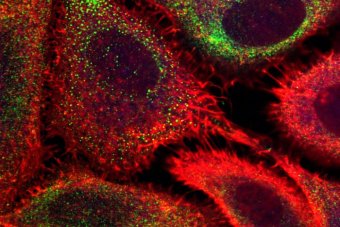
An Australian-first study by Queensland researchers has revealed how fats, including cholesterol, increase the progression of aggressive cancers.
The study focussed on how fats work to regulate cell function but at the same time create proteins that are elevated in more aggressive cancers.
The research, conducted by the University of Queensland‘s Diamantina Institute, originally looked at links between fats and prostate cancer.
But Associate Professor Michelle Hill said that link had now been widened.
“We have extended the finding to breast cancer, melanoma, kidney cancer and ovarian cancer,” she said.
“It seems to be a broad range of cancers and possibly all cancers.
“Cholesterol and other fats are essential components of cell membranes and play a vital role in regulating cell migration and division.”
But these membranes also play a role in increasing cancer progression through what is known as cyctoskeletons, a network of fibres connecting parts of the cell throughout the body.
Dr Hill said scientists were now trying to identify the specific cancer-associated change or triggers in this network.
“Then more specific therapies can be designed to kill cancer without affecting normal cells,” she said.
Dr Hill said the previous study on prostate cancer revealed a reduction in the cytoskeleton cholesterol membrane link when a gene that suppresses the tumour growth was activated.
When the research team tested a completely unrelated tumour suppressor gene in an ovarian cancer cell model, it found the same results.
Cholesterol and fats are found in a basic healthy diet and essential fatty acids are crucial to maintaining health.
But Dr Hill said the research reinforced to cancer patients how vital it was to maintain low cholesterol.
“Through exercise, diet and drugs in consultation with their clinicians,” she said.
The study has been published in the Journal of Proteome Research.
